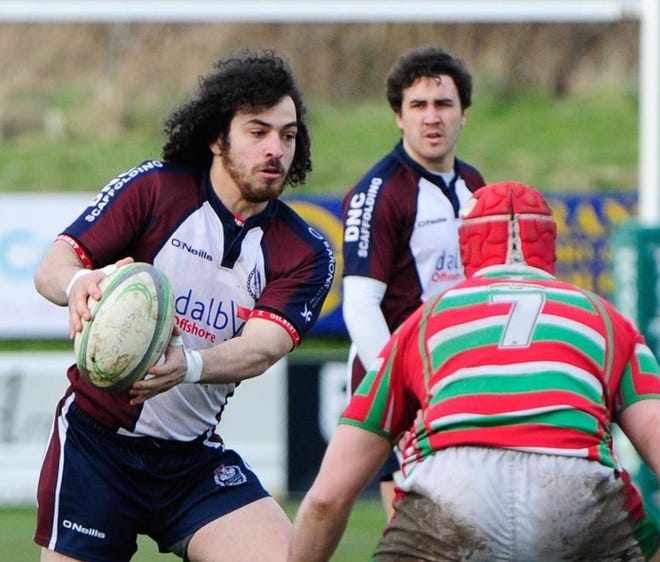For years, Devin Ibañez took pains to keep his professional rugby career separate from his personal life.
The Brookline native had come out as gay to his parents at just 11 years old and was open about his sexuality with friends. Yet it would be another 16 years before he shared that news with the world, becoming the first openly gay Major League Rugby player.
Since publicly coming out in December, Ibañez has dedicated himself to making sports a more inclusive space for everyone.

Growing up in Brookline, Ibañez recalled the town’s acceptance of LGBTQ people. The sporting community, however, was another story.
“I still felt like it was still very typical and kind of hyper-masculine culture where I didn’t really feel comfortable sharing [my sexuality],” he said.
The 2011 Brookline High School graduate got his start with rugby there, continuing through his time at UMass-Amherst and going on to play abroad in Australia, New Zealand and the United Kingdom.
Ibañez also represented the U.S. at the 2017 Maccabiah Games, where the team won gold. He played locally after returning to the Boston area, becoming one of the first players signed to the Major League Rugby team the New England Free Jacks, founded in 2018.
Even as his pro career grew, Ibañez hesitated to come out publicly.
He knew of other LGBTQ rugby players who had, many years prior, been effectively blackballed from the sport due to the stigma. He also wondered whether he would be tokenized and shown favoritism in the name of inclusivity.
“You just get into your head so much about what the impacts of it could be,” he said.
After taking a shoulder to the throat in 2017, he suffered a severe injury that left him re-thinking how he wanted to live his life. He met his partner, Fergus Wade, soon after.
Fast-forward a few years, and the pandemic hit – rugby was on hold, and Ibañez was physically separated from Wade, who was studying abroad in the UK. On Dec. 29, with Wade’s birthday and the couple’s third anniversary just days away, the timing was finally right.
“I was like, ‘I don’t want to let a whole other year go by where I can’t publicly wish my partner happy birthday [and] I can’t publicly celebrate our love and our anniversary,’” Ibañez recalled. “And then I just had this urgency all of a sudden, where I was just like, ‘You know what, I’m going to stop putting this off.’”
He sat down on his lunch break at work and typed out the social media post that had been long in the making.
“I’d been putting this off for years, because I felt like I needed to accomplish more or prove myself more as a rugby player,” he said. “It’s like, there’s no rugby going on anymore; now it’s just me and what’s best for me and my partner.”
The post on his Instagram account, @thatgayrugger, took off, drawing attention from all over the world.
“It was just a crazy kind of whirlwind experience, where something that I had just written as kind of like an open love letter to my partner became this big, kind of international story,” he recalled.
The rugby community’s response was overwhelmingly positive; to date, Ibañez said he has not received one negative message.
“In rugby, there’s this kind of perception that we have of ourselves that we are the most inclusive sport, and that anybody can play and the only thing we care about is if you’re a great player and a good teammate,” he explained.
At the same time, Ibañez knew that wasn’t always the case.
Last year, governing body World Rugby passed a policy banning transgender women from competing in international women’s competitions.
When Ibañez saw his broad network of rugby contacts remain mostly silent on the issue, he decided to speak up.
“I really felt like it would be incredibly impactful if I could just like, come forward and not only say, ‘Yes, I’m an openly gay rugby player,’ but also say these are issues that should be important to all of us, not just to women’s rugby players, not just to queer rugby players,” he said.
He later partnered with artist Richard Lopez, who had heard him speak on the podcast Race Chaser and wanted to launch a fundraiser. World Rugby’s ban wasn’t set to be reconsidered soon, so the pair are fundraising for the Transgender Law Center, which provides legal advocacy and support to transgender people facing discrimination.
They’ve raised more than $5,500 in less than two weeks and hope to make it to $7,500 by the time the fundraiser closes June 6.
Reunited with Wade in London and playing rugby with Richmond Football Club there, Ibañez – who was recently named International Gay Rugby’s global ambassador – is buckling down on his advocacy and community outreach.
“It’s not just about making rugby more accessible to gay athletes, it’s about making it more accessible to all parts of the LGBTQ community, but also making sure that it’s racially inclusive, making sure that all backgrounds and all cultures feel accepted and loved,” Ibañez said. “Unfortunately, with the history of rugby, it is still very much so an overwhelmingly white sport.”
Ibañez has also set his sights on the 2022 Maccabiah Games, where he said he would like to serve as Team USA’s first openly gay captain.
In the meantime, he plans to continue his public speaking and activism. Sports, he said, have the power to set an example of what diversity and inclusivity should look like.
“I just want to marry my two loves of rugby and being myself and showing people that those don’t have to be mutually exclusive things,” Ibañez said.
To donate to Ibañez’s Transgender Law Center fundraiser, visit tinyurl.com/TLCfundraiser.

